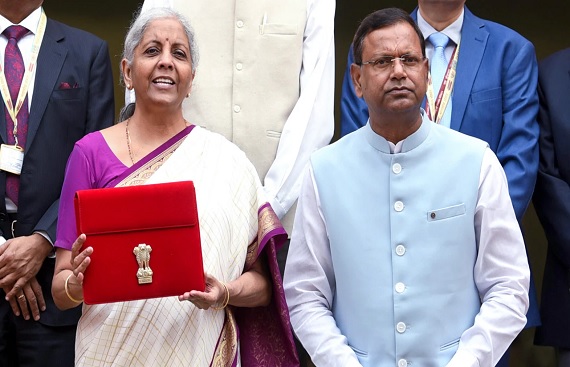Finance Minister Sitharaman to Present Record 8th Straight Budget
By
siliconindia | Saturday, 01 February 2025, 21:51 Hrs

Finance Minister Nirmala Sitharaman will present her eighth consecutive Union Budget on February 1, 2025, a historic milestone in India's financial governance. She will be the first finance minister to deliver eight straight budgets under the same Prime Minister, breaking previous records. Economical growth, fear of inflation issues, and concerns over the burden on the middle class are predicted to be top priorities in an upcoming budget under fiscal discipline. The country navigates global economic uncertainties and at home, economists are keen on seeing what a budget will reveal in terms of investments, increased employment, or sustainable development across the board in the country's economy.
This presentation takes Sitharaman one step closer to a record set by former Prime Minister Morarji Desai, who had presented a total of ten budgets during his tenure as the Finance minister under two different prime ministers. Desai presented six budgets between 1959 and 1964 and four more between 1967 and 1969. Other prominent finance ministers who have made a mark in the history of budget presentation include P Chidambaram, who presented nine budgets, and Pranab Mukherjee, who delivered eight. The budget is not only a financial statement but also a roadmap that reflects the government's vision for economic policies and growth strategies.
Since taking up the position in 2019, Sitharaman played a crucial part in the design of India's economic policies, especially during the COVID-19 pandemic and subsequent recovery phase. She has introduced many reforms under Prime Minister Narendra Modi to facilitate the digital transformation, infrastructure development, and fiscal consolidation. Her budgets have focused on ease of doing business, supporting manufacturing, and widening welfare programs to vulnerable sections of society. As she gets ready to present the 2025 budget, everyone is keenly awaiting what this budget may have in store for tax relief, incentives for industries, and steps to counter inflation that has eroded household incomes.
India's budgetary history dates back to November 26, 1947, when the first Union Budget of independent India was presented by R.K. Shanmukham Chetty. The budget over the years has evolved with changing economic priorities of the country and its global positioning. Morarji Desai remains the only finance minister to have presented ten budgets, which marks a benchmark in financial planning and policy-making. His first budget was presented in 1959, followed by a series of full and interim budgets that spanned across different tenures. P Chidambaram is one of the well-known personalities associated with Indian economic policy. He presented nine budgets during his time in office: first in 1996 and later as part of the Congress-led UPA government. Another leader who left his mark was Pranab Mukherjee. He presented eight budgets, and five of those were consecutive ones between 2009 and 2012. Former Prime Minister Manmohan Singh was one of the chief architects of liberalization in the Indian economy. He presented five consecutive budgets during the P.V. Narasimha Rao government between 1991 and 1995.
Sitharaman, too, is a part of history with her budget speeches. She delivers the longest budget speech in the history of India, which is two hours and forty minutes on February 1, 2020. The speech was so long that she had to skip the last two pages. Conversely, the shortest budget speech in the record is by Hirubhai Mulljibhai Patel in 1977, amounting to just 800 words. These speeches actually not only give out allocations on financial matters but also set the tone for government policy direction for the fiscal year ahead.
Over the years, the timing of the budget presentation itself has witnessed considerable change. In earlier times, the budget was traditionally presented towards the last week of February at 5 pm. This was a colonial tradition under which announcement could be made simultaneously in London and India. This practice was stopped in 1999 when then Finance Minister Yashwant Sinha moved the timing to 11 am, which is more convenient for Indian policymakers and stakeholders. The other significant change occurred in 2017 when the budget presentation date was advanced to February 1 to streamline the parliamentary approval process and ensure implementation from the beginning of the financial year on April 1. Before this change, budgets presented on February 28 or 29 often experienced delays in execution because of the lengthy approval process.
As Sitharaman prepares for her eighth budget that will break a record, much is expected in terms of stimulus measures for the economy, tax reforms, and policies to drive growth. Expectations are also high on infrastructure development, incentives for startups, and relief measures for sectors that are still in the process of recovery from the pandemic. With a global slowdown in the economy and inflation pressures mounting, achieving fiscal prudence in tandem with growth-oriented policies would be an overarching challenge. The Sitharaman budget would only reaffirm her role as an important architect of India's economic roadmap under Modi, putting into place continuing reforms and strategic investments.
